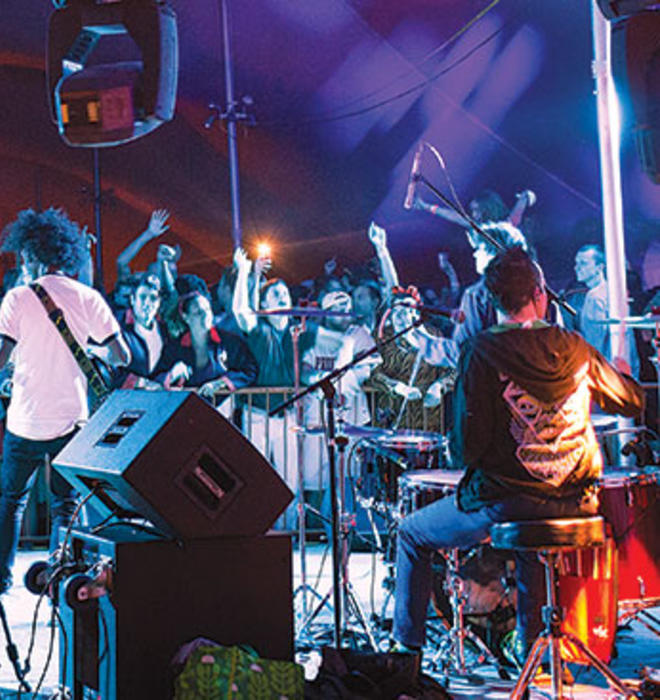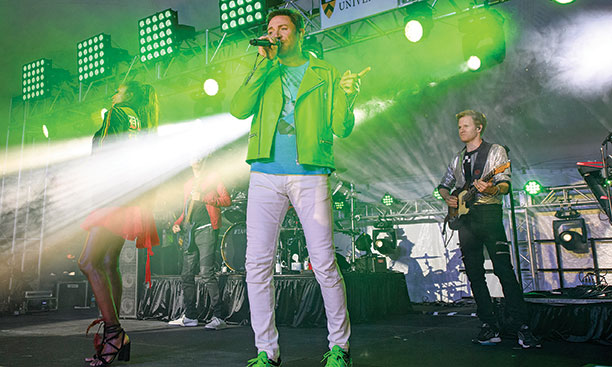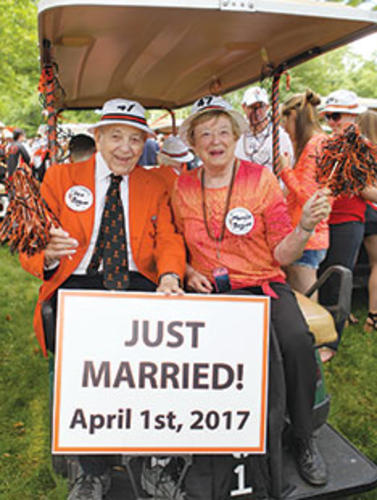
Alumni might come back for Reunions to be transported to their college days, but this year, the political moment proved inescapable. About 26,000 alumni and guests partook in Reunions June 1–4, and amid the usual revelry were panels and serious talks about pressing political issues. Even in the sea of orange called the P-rade — with its Mummers, beer-drinking, and dogs masquerading as tigers — there were many displays of political activism.
As usual, Reunions events spanned a wide range of topics, including work-life balance, health care, entrepreneurship, China, and sports. Some found unique ways to blend Princeton’s educational mission with Reunions’ tradition of imbibing. The Association of Princeton Graduate Alumni offered “Full Flavored Science: A Talk and Tasting on Wine and Cheese Production,” while “Beers with PIIRS” nurtured understanding of global affairs through beers from around the world. The full schedule of panels and talks ranged from the future — where new developments in space exploration may lead — to the past, as a pair of sessions sponsored by the Class of 1957 looked back on changes to student life and the physical campus over the last 60 years (72 buildings have been added).
National politics often was on full view. Many panels this year focused on political topics (see page 38). Some alums marched in the P-rade wearing the pink “pussy hats” popularized during women’s marches protesting the agenda of President Trump. Princeton Progressives, a group of alumni that supports progressive student activity, brought the pink hats for alumni to wear. Other alums wore a special black-and-orange version of the hat. The TiGrrrHat Project sprang from a grassroots effort led by Sue Gemmell ’82 and Alison Holtzschue ’82; the pair envisioned a river of black-and-orange hats bobbing through campus. “Every time you saw someone in a pink hat [at the women’s marches] you felt this solidarity, and that’s the same wonderful, uplifting feeling you get at Reunions,” said Holtzschue, who helped coordinate volunteers who sold and distributed almost 700 of the lightweight caps at Reunions and through their website. Donations collected will go to a campus student group not yet determined.
Russ Hensel ’67’s wife, Karen Quigley, was one of many who marched with a political sign; hers said: “March for Truth.” “The truth is not supposed to be partisan,” Hensel said as they lined up. “RESIST” screamed one side of a sandwich board worn by a ’71 alum; “Save Our Democracy” read the other. A few pro-Trump signs were also sprinkled throughout the crowd.
A key figure from the 2016 election was on hand. Sen. Ted Cruz ’92, wearing his new 25th-reunion blazer, posed for photos with admirers, critics, and the Princeton Tiger. On Friday, Cruz and his former debating partner and roommate, David Panton ’92, took on Cydney Kim ’17 and Nathan Raab ’17 on the lighthearted question of whether it was better to be Princeton alum or a Princeton student.
Cruz spoke first, making a case for post-college life: “Seniors: You better hope we’re right.” He made sport of 2-foot-tall refrigerators, sheets “with a thread-count of 13,” and the poor quality of beer in college. But Raab powerfully retorted that in college, beer quality is secondary to beer quantity. Panton and Cruz, who outlasted 14 GOP hopefuls in last year’s presidential primary contest against Donald Trump, couldn’t beat Princeton’s student team.
The energy of the weekend seemed even more pronounced than usual. Silver-cane winner Joseph Schein ’37, who is 102 years old, walked the entire P-rade route. Jay Lehr ’57 led his class, as he always does, on his unicycle. P-raders boogied their way onto Elm Drive. For the first time, a student DJ stationed at the top of Elm Drive played hits from the era of each class. Gloria Umutoni ’18’s playlist moved through the decades: from Fred Astaire’s “Puttin’ on the Ritz” (1930s), through Johnny Cash’s “I Walk the Line” (1960s) and Rick Springfield’s “Jessie’s Girl” (1980s), and ending with the music of the youngest alums: Bruno Mars’ “24k Magic” and Beyonce’s “6 Inch.”
Headliners drew overflow crowds. On Saturday night, the 30th-reunion in Butler courtyard attracted a frenzied audience to see Duran Duran, one of the biggest pop bands of the 1980s. For more than an hour, at high decibels and with strobe lights flashing rhythmically, the band raced through some of its biggest hits of the Reagan/Bush era: “Hungry Like the Wolf,” “Girls on Film,” and “Rio” — transporting members of the Class of 1987 back to their youth and showing a large group of graduating seniors how Mom and Dad used to get down. Grammy-winning hip-hop trio Naughty by Nature performed at the 25th–reunion headquarters.
WATCH a video essay, “Reunions at 100,” featuring Norman Carter ’38
The big draw of the weekend was not famous musicians, but seeing classmates. For former residents of third-floor Blair, a star was Alex Suh ’92, attending Reunions for the first time. “A unicorn is someone at Reunions who you keep hearing is here, but you haven’t seen,” said June Wu ’92. “Alex was all of our unicorn!” Suh described the experience of being back as “a little bit like The Twilight Zone.”
And two of the most-photographed people at Reunions were not famous politicians or musicians: They were newlyweds Merry Lee and Don Berglund, Class of 1947. The couple carried a sign in the P-rade that announced: “Just Married! April 1st, 2017.” They were introduced by friends from their retirement community in Cupertino, Calif., about a year and half ago.“Everyone just burst into laughter and pointed when they saw the sign,” said Merry Lee. “And I think hundreds of people took our picture.”
“I was offered probably at least two dozen cans of beer along the way,” Don added.










6 Responses
R.H. Van Fossen Jr. ’63
8 Years AgoCover Headline Suggestion
Published online Oct. 23, 2017
When she delivered the July 12 issue with the cover headline “Reunions and Commencement”), our postal carrier wondered, “I didn’t know Princeton was a women’s college.” My response: “It’s not, unless you are extrapolating the last 30 years.” My feeling was that the cover headline more appropriately should be: “Princeton PC run amok; blondes not welcome.”
Tina White ’82
8 Years AgoAn Open Letter: Dear Class of 1982
At Reunions, you gave me a gift that is beyond precious. Our 35th was my first class event since graduation. I had taken my diploma with you as William Thomas White. I returned this year as Tina Madison White.
I was terrified!
I need not have been. Your gracious reception and gentle inquisitions brought welcome relief. And I thank you. But you gave me so much more.
Discussions of transgender people tend to focus on the visible drama: our change in appearance; the discomfort others feel; the violence and discrimination we face. But our greatest drama isn’t one you can see.
For most of my life, I wanted nothing so desperately as to be a man — to be a sturdy comrade, a loving husband, a gentle father. The knowledge that I wasn’t one haunted my every day.
I tried everything to fix myself — sports, therapy, medicine, prayer ... marriage. I even joined the Ivy Club, hoping that its gentle fraternity might cure me.
I did all this in secret. Not even my family must know. The one “manly” thing I could do was to protect those I loved from my shame. So it was that I wandered the halls of Princeton.
When you travel the world as someone not you, you live a life of solitary confinement. Nobody knows who you are; their expressions of affection cannot touch you. I never felt, for example, the embrace of my mother’s “I love you’s.” She was loving someone not me.
I couldn’t even have a relationship with God. It wasn’t that God wasn’t there; it was that I wasn’t.
Such solitary confinement is profoundly dehumanizing. It will destroy anyone. In Obergefell v. Hodges, the Supreme Court asserted that to express and share our identity is a human right. I am here to say that it is a human necessity.
When I finally graduated from Princeton, I wanted nothing more than to put my past behind me. I had experienced alienation, shame, and isolation. Who would want to return to that?
Such was my state of mind as Reunions approached. It wasn’t you I didn’t want to return to. It was myself.
But, over the weekend, something wonderful and unexpected happened. With each of our conversations, I felt decades of sorrow and alienation melting away. For the first time in my life, you were talking to me! For the first time in my life I was at Princeton!
And that was your gift. While the rest of you were celebrating your 35th reunion, I was finally attending my commencement. You supplanted decades of sorrowful memories with ones of warmth and happiness. In three days, you returned years of my life to me.
And I thank you.
stevewolock
8 Years AgoA Poignant Letter
Re “An Open Letter: Dear Class of 1982”: It’s unusual to see a note in the news and realize you’re staring history straight in the face. In whatever database the editors gather the best of 200 years of PAW in 2100, this letter will be included, and our fellow Tigers in the Class of 2082 rightfully will be most proud of their great-great-grandparent class.
A locomotive each for Tina White ’82 and her loyal friends; class officers and Reunions exist for a substantive reason, and this assuredly is it.
Jamie Spencer ’66
8 Years AgoA Poignant Letter
Two seemingly unrelated items in the July 12 issue came together for me. The first was the account of Professor David Bellos’ new book on Les Misérables (Life of the Mind). Bellos observes that Victor Hugo, in a search for “solutions” to social ills, rejected “political action” and “look[ed] to individual acts of charity and generosity.” The other item was the poignant letter from Tina White ’82 thanking her classmates for their “gracious reception and gentle inquisitions” at this year’s Reunions. Her classmates’ open and supportive reception of her successful transition from Bill White to Tina provides eloquent testimony to the accuracy of Hugo’s judgment. It is also a reminder of the “wonderful” power of individuals who bring charity and generosity to interpersonal relations.
Walter Weber ’81
8 Years AgoResponding to a Different Perspective
Published online Oct. 23, 2017
I am glad that William Thomas (now going by Tina) White ’82 was received graciously at the class reunion (Inbox, July 12). That is as it should be, for White and for all people.
I hope the broader Princeton community will likewise respond graciously to those who believe — recognize — that one cannot change one’s biological, genetic sex, and that one’s inner sense of being a different gender, no matter how sincere and long-standing, is as unconnected to physical reality as an anorexic person’s genuine sense of being overweight. To welcome White with charity while launching epithets and reprisals at those who have a different perspective is ... inconsistent.
Lloyd Price ’73
8 Years AgoMusic at Reunions
The choice of the group Naughty by Nature as entertainment for the Class of 1992’s 25th reunion was shortsighted at best, deplorable at worst. I am not a music critic, nor do I typically engage in artistic censorship. However, this group spouted a constant stream of offensive lyrics that were not worthy of the students, alumni, nor an institution that is already trying to distance itself from a hateful, intolerant past. This choice did not further that goal.
Twenty-five years prior to the graduation of this class, the use of the N-word was a matter of common utterance directed at African Americans by those spewing hate and harboring misguided illusions of superiority. Today, African American men and women without historic context embrace the N-word in everyday language as if to remove the sting through what is claimed as ownership. This is a ridiculous argument that merely legitimizes the use of the word by others. This is beyond being politically correct.
Without debating freedom of artistic expression, Princetonians need to aspire to higher standards than those that drag the larger society through the gutters and hasten our moral and ethical decline.